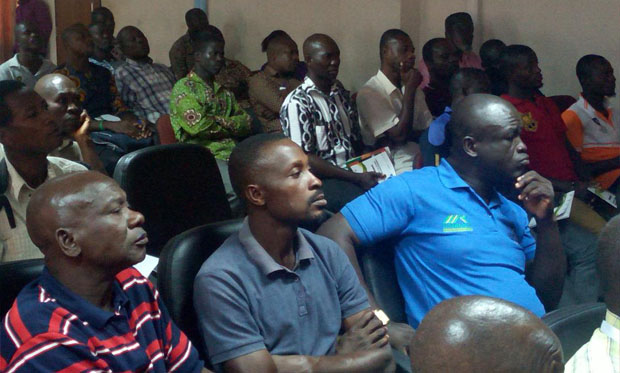Some of the participants
Electric waste (E-waste) has been described as hazardous due to the presence of some toxic materials such as mercury, lead and brominated flame retardants.
To this end, there is a convention on the trans-boundary movement and disposal of the hazardous waste called ‘Basel Convention’ which Ghana has ratified.
According to the Basel Convention, the hazardous metals can be recovered, recycled and used as valuable source of secondary raw material.
This came to light at the opening of a three-day training programme on e-waste management for scrap dealers, refrigeration and electronic repairers associations in the Western and Central Regions at Takoradi yesterday.
It was on the theme: ‘E-Waste Management In Ghana (E-MAGIN) – From Grave to Cradle’.
It was organised by the University of Cape Coast (UCC) in collaboration with City Waste Recycling, Ghana; Ghana National Cleaner Production Centre and Adelphi, Germany.
The programme was to help build the capacity of the participants to be able to work within the regulatory framework.
It was also to ensure that the health and safety of the participants and the environment in which they work is not compromised.
It was funded by the European Union (EU).
Speaking at the programme, Yaw Sarfo-Afriyie, Western Regional Director of EPA, pointed out that the challenge of sustainable management of electronic waste is not peculiar to Ghana alone but a global phenomena.
He revealed that parliament has passed the Hazardous and Electronic Waste Control & Management Bill into law.
“One of the objectives of the law is to streamline the activities in waste collection and management industry. This is to ensure a sound waste management and recycling systems to save the country’s environment which is in line with the Basel Convention,” he added.
Prof Rosemond Boohene, Project Coordinator, E-MAGIN, explained that her outfit is poised to contribute to effective implementation of the hazardous and Electronic Waste Control Management Act.
She indicated that E-MAGIN is a 48-month project and that the target group includes medium-sized enterprises in the e-waste recycling, collection and refurbishing business.
Prof Rosemond Boohene added that the law requires, among other things, producers and private importers to register with EPA and pay advance Eco Levy for electronic goods processed or imported.
From Emmanuel Opoku, Takoradi


